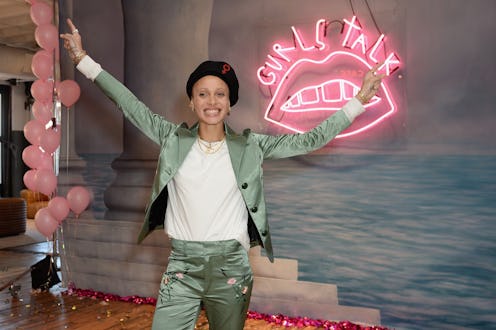Entertainment
You Need To Read Adwoa Aboah's Comments On Mental Health & Modelling As A Black Woman

According to Brit(ish) author Afua Hirsch, with whom Adwoa Aboah talked mental health, body image, and her experiences in the modelling industry as a black woman, Aboah considers herself an activist before she is a model. A new profile of her in the Guardian, which you really should read in its entirety, makes the reason apparent: Aboah "puts a tremendous amount of effort" into Gurls Talk, the mental health charity spawned from an Instagram account established in 2015, Hirsch wrote.
Aboah discussed the growth of Gurls Talk (you should also listen to the podcast, by the way), and the "monumental" experience of hosting an event in Accra, Ghana. "I introduced each panel, but I made a point of handing the torch over to give all these amazing women the chance to do what they do," she told Hirsch. "At first, everyone was a bit shy, but then they started putting their hands up and sharing all these things — around sexual assault in school, for example, things I didn’t necessarily know were such big subjects because I didn’t grow up in Ghana. But I have been going there all my life. It was monumental to me."
Aboah has long been a vital voice in the mental health conversation, speaking about her own experiences of depression, bipolar disorder and addiction. Those issues began to present in boarding school, she said. "I think it was obvious something was wrong, because I would miss loads of school. I just thought it was because I was really homesick," she said. "I didn’t feel suicidal or anything like that then. I just wanted to jump out of my skin. I felt unhappy and insecure and pressured."
Aboah was "painfully shy" at school, she said, while dyslexia made it more painful. "The trauma that surrounds you feeling like you were stupid is something that stays with you for a long time," she added. "It wasn’t until I got sober that I realised it didn’t matter that I couldn’t punctuate or spell. I could still write if I wanted to."
"With Gurls Talk, I’ve created a space where we get to talk about those things, where we get to bring all our shit into that room, where anything and everything is important," Aboah said.
Aboah, who has a Ghanaian father and English mother, told Hirsch, "Growing up, I saw myself as not-black-enough and not-white-enough," saying, "But it was only when I got to boarding school that I was like: 'Oh my God, this is an issue.'" Boys were "not interested" in her, the activist said. "I could just piece it together from the girls who were idolised. I was never going to look like them. So I immediately thought I was hideous," she said.
Aboah, like an unacceptable number of black models, encountered hair stylists who were unable to style her hair. "You couldn’t possibly explain to someone the embarrassment of sitting in a chair at a modelling job and having 10 people around your head, struggling with your hair," she said. She also addressed colourism in the modelling industry. "I don’t underestimate my privilege as being more light-skinned," she said. "It’s definitely helped me that I fit into a certain box."
Her work as a model, Aboah said, doesn't conflict with her goals as an activist. "I think about modelling and whether it works alongside everything I advocate," she told Hirsch. "I question whether it’s a part of this idea of beauty that does harm. But then I think about the younger me, and seeing someone like me reflected back would 100 percent have helped her. Just me being unapologetically myself is even more important than my face."
This article was originally published on